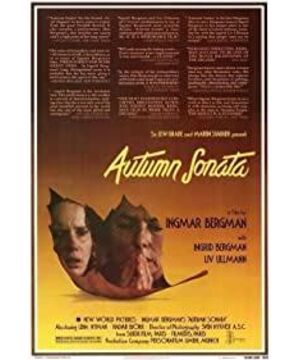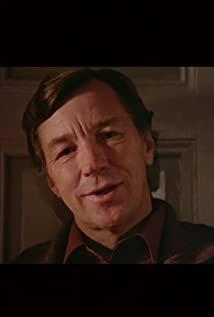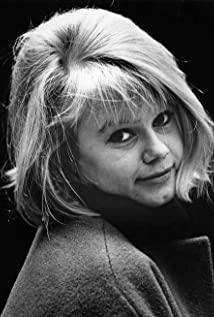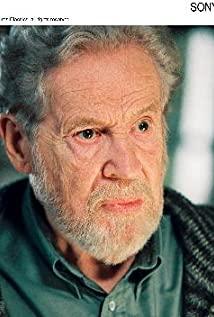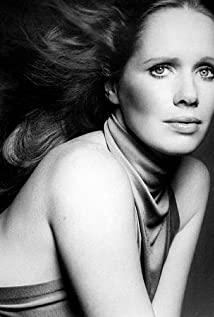I was about seventeen or eighteen when I saw Ingmar Bergman. The only one I think I "understand" is "Autumn Sonata". At that time, out of interest, I translated an English essay by Eileen Chang, probably about the jealousy and hatred between mother and daughter.
I remembered this movie many years later because of a small shop on Taiyuan Road. (What a wonderful place Shanghai is, with evening breezes and roses.) But maybe it's because of something else. All in all I remembered all of Bergman's films, and the funny thing is that I was shocked and moved by them when I was so young.
So is "Autumn Sonata" really a movie about a mother-daughter relationship? It doesn't seem to me now. It is about the harm that the mediocrity of life does to people.
The musician's mother, played by Ingrid Bergman, is invited to the home of the daughter of the pastor's wife after her second husband's death. The whole film consists of intense character dialogues, and the content basically expresses daughter Eva's regret for her mother Charlotte's neglect of her family for her career in her early years, and her mother's helplessness for all this. The love and hate between mother and daughter intertwined in a night of talking to each other, and their dialogue constitutes a heart-wrenching question about life:
1. Why is family life so different from art?
The music constitutes a thematic shift in the mother-daughter conversation. While Eva babbled about her mother's neglect of her, her sister, and her father in childhood, Charlotte babbled about the music played in those years, those festivals, and between the conversations, they played Chopin separately. The morality of the superego that one perceives in music cannot be explained to the specific roles and responsibilities of life. Therefore, behind the mother who is addicted to music, there is a family who is waiting for her. However, during the conversation, Eva soon discovered that the anguish was unreal. Just because she is a daughter puts Charlotte in the position of a mother and has expectations and disappointments for her. She ended up assigning Charlotte "guilty anyway", and Charlotte was desperate to be a different mother.
People often overlook the harm that the mediocrity of life does to people, especially to artists. Because the essential attribute of life is mediocrity, this mediocrity is naturally exhausting, and this exhaustion is too cruel to the imagination of the agitated, sonata-like artist. Charlotte said that "total reality is a gift", and for her to be truly mundane is not a lack of opportunity, but a lack of ability.
Mediocrity is life. The mediocrity of life is terrifying even for the most mediocre people, because life is always crueler than people. It is more ruthless and calls for oblivion. Therefore, the family as a part of life constitutes a covetous eye on human nature. Behind the family is an extremely ancient tradition of marriage. No one knows how to protect this tradition. They can only use laws, morals and obligations to restrict human nature, instead of actively adopting constructive measures based on some primitive kinetic energy based on belief. action. In fact, apart from marriage, many of the morals of modern people are just fulfilling their duty as a house dog, and they are doing the weakest defense to protect the tradition. This passive voice is lonely and shameful.
2. How do realists live? How do idealists live?
In her almost questioning and reckoning with her mother, Eva resorts to the philosophy of the realists. Life was real, she took her sister over, she married a priest who "didn't fall in love". All of her indictments against her mother's negligence rested on a fundamental idea that no matter what life is like, it must be done first. Charlotte, on the other hand, is an idealist who believes in music, a form that cannot be settled in the world. The spirit she relies on is mainly humanistic.
But there's also a character in the movie, Eva's husband, Victor. I think many of Bergman's films have a shadow of his own story. As the son of a court priest, as a film director, he is the only person in the entire history of film who directly discusses Christ from the perspective of film art and philosophers. Note that it is Christ and not Christianity. In "Winter Light", the group portraits of believers against the background of the Eucharist pose questions about "whether Jesus exists" and "why is God silent"; "The Seventh Seal" uses "Revelation" as the text to explore the meaning of the end times to human nature. Bergman has devoted his life to this eternal and necessary question, an obsessive quest for the way out of humanity in the horrific climate of God’s absence, religious questioning, and Christian skepticism in the 20th century. Even asking a single important question in a lifetime already constitutes an identity that no matter where the film goes, Bergman is there.
Victor balances the tension and complexity of mother-daughter relationships with the clergy-like "God's perspective." In fact, we can all be Eva, and we can all be Charlotte. It is important that we all need to understand that whether we are realists or idealists, we have to live in the world. Victor gave Eva marital care as God's common grace, so Charlotte said, "Blessed is my daughter, this crybaby, who has found a good husband." Victor is also an idealist, But unlike Charlotte's devotion to music, he appealed to "unfathomable wisdom." Idealists actually have a harder time living. No matter how brilliant Charlotte is in her playing, marriage, family, motherhood... In the face of the mysteries represented by these ancient and banal traditions, idealists have little way out but to flee or cut themselves off. So Charlotte admitted what her daughter said she was "guilty" and hoped to be exonerated. The Victorian solution, neither by Eva's rationality nor by Charlotte's talent, could be called some kind of "naivety", subservient to a greater wisdom against reality and ideals The consumption of life by two mediocre forces.
3. Why does love make us experience hate?
Although it is mentioned above that this is not a film that simply explores the relationship between mother and daughter, it is the most profound film that explores the relationship between mother and daughter. Bergman is acutely aware that it is love, not hate, that causes individuals to suffer. When we talk about "love", we only use it in general to refer to all the good intuitions we experience or expect, but love is essentially a kind of charity of the infinite to the finite, and conversely, the finite to the finite. An infinite deprivation. Love is especially untrustworthy if there is no deprivation and loss of liberty in it. And human design is not so omnipotent and complete, so in true love, what people experience deeper is only pain, which is extended to hate.
The hate that Eva tells contains "waiting", she waits for her mother to return home, to watch her, experience her, and be with her; the hate that Charlotte tells includes "leaving", she expects her daughters to be with her. The husband gave her that freedom as a person rather than a mother and wife, and she expected that she would be able to turn to her daughter, even an ailing daughter, without always being a benefactor. Waiting or leaving is a sweet, timid imagining of love that never ends.
Because love, as a kind of energy, cannot be borne by human beings. Can't see it, can't understand it. The more I try to understand, the more I find myself broken and sad. Now I think of Eileen Chang's small article translated back then. She saw the kind of brokenness and sadness. She let the mother and daughter meet in the maze-like garden, but only recognized each other's hatred; Bergman put the The source of this hatred goes straight to love itself, not desire or anything else that makes humans weak, it's love, which draws people facelessly, cynically, and indiscriminately to feel pain. Just as life itself is banal and hopeless, love itself is a very specific, emotionless charity, which is why there is such a big difference between the Chopin played by the daughter and the mother, the mother said;
"Chopin is not sentimental, Eva. He is very sentimental, but he is not sentimental. There is a world of difference between sentimentality and sentimentality. The overture you play shows repressed pain, not dreams. It should be Calm, clear and severe. The temperament is frenetic, the performance should be decisive and restrained...It hurts, but I don't show it. Then there is a brief relief, but it disappears almost immediately. Still The same pain, no more, no less. Repressed from beginning to end. Chopin was proud, sarcastic, passionate, tortured, furious, and resolute. In other words, he was not a self-willed The old woman. The second prelude should be played almost unpleasantly. It must not be made into something pleasing. It should be played as if it were played wrong. There must be a fight throughout the performance, and it will end in triumph."
——This passage borrows Charlotte's mouth to point out exactly the kind of peaceful pain that Bergman wants to express in life and love. Charlotte is a talented performer, she understands music, but even she is trapped in this love-hate life. Victor doesn't argue anything, even accepts Eva who "doesn't know how to love" and thinks they are "very harmonious". It's easy to think of an oriental and dispelling philosophy of life here, but it's not the case. , Victor's solution to the pain is not from a personal reconstruction, i.e. selfishness, but "from above", he recognizes the unexplainable part of his marriage to Eva, so he says "the only thing I have A little faith, it's up to her." "Sometimes, I stand outside and watch my wife without her noticing. She's so sad. The first few nights were horrible. She couldn't sleep. She said, she Got my mother out, she'll never be able to forgive herself. If only I could talk to her. But it's just a lot of crap and empty talk. I just have to stand and watch her suffer and helpless." He didn't want to. What to change, he considers conversation to be "bullshit and empty talk", but it just so happens to constitute the most powerful defense against life's ultimate boredom, and he is what Charlotte calls "a gifted man who can deal with reality."
Bergman's film system is anti-dissolution. Now, the future of disintegration he once feared so much (more so than China making the atomic bomb) has arrived. No matter what anyone honestly says, they're just going to dispel him. Now is an era that Bergman once feared its coming, an era in which only realists can survive. If Bergman's anxiety, struggle and resistance to the "horror of God's death" were once a reflection of the 20th century. The biggest fruit, now, this kind of struggle can be completely eliminated, people not only throw God in the trash, but also use "God" in various names for their own entertainment and entertainment to death. Before love and hate disappear completely, the world is like his movie, like an orphan, echoing in search.
View more about Autumn Sonata reviews


